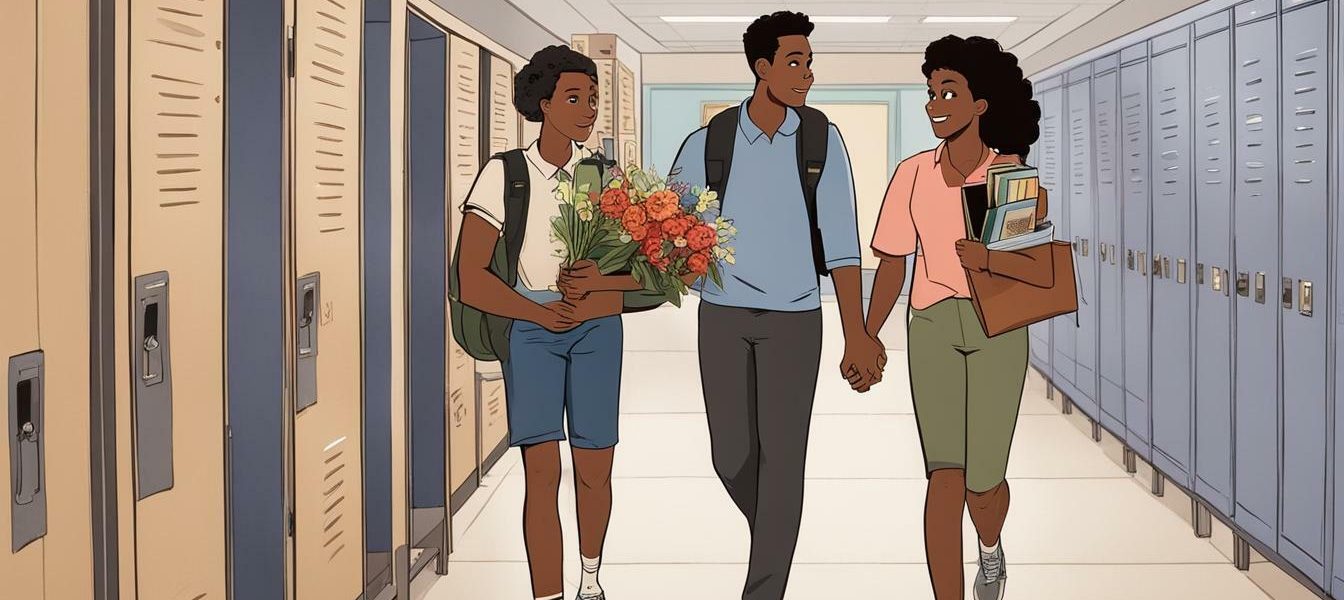
Do Highschool Relationships Last?
High school is often portrayed as a time of young love and heartbreak. But do these relationships have the potential to last beyond graduation?
There are many stereotypes surrounding high school relationships, with some dismissing them as fleeting and insignificant. However, the truth is that some couples do go on to build successful, long-lasting relationships.
Key Takeaways:
- High school relationships can have the potential for lasting love.
- There are common stereotypes surrounding high school relationships.
- Some couples do go on to build successful, long-lasting relationships.
Factors for Long-lasting Highschool Relationships
High school relationships can be challenging to navigate, but they can also be incredibly rewarding. If you’re looking to make your high school relationship last, there are a few key factors that can contribute to its longevity and success.
Effective communication
One of the most important factors in any relationship is communication. In high school, it can be especially important to be clear and honest about your feelings and needs. Make sure you’re both actively listening to each other and taking the time to understand each other’s perspectives.
Tip: Schedule regular check-in conversations to talk about anything that’s on your mind.
Mutual respect
A successful relationship is built on a foundation of mutual respect. This means treating your partner with kindness and consideration, even when you’re upset or disagree. Avoid resorting to name-calling or belittling language, and take the time to validate your partner’s feelings.
Tip: Practice empathy by putting yourself in your partner’s shoes and imagining how they might be feeling.
Trust
Trust is a crucial element in any relationship, and it’s especially important in high school when there are so many distractions and competing priorities. Make sure you’re both on the same page when it comes to issues like fidelity and honesty.
Tip: Avoid snooping on your partner’s phone or social media accounts, as this can erode trust and breed mistrust.
Shared values
Having shared values and beliefs can help you and your partner feel more connected and aligned in your relationship. Make sure you’re both clear on what’s important to you and discuss how your values might impact your future together.
Tip: Take the time to learn about your partner’s interests and hobbies, even if they’re not necessarily your cup of tea.
By incorporating these factors into your high school relationship, you can help ensure its success and longevity. Remember, every relationship is different, so it’s important to find what works best for you and your partner.
Challenges of Highschool Relationships
While high school relationships can be exciting and fulfilling, they also come with their own challenges. These challenges can be exacerbated by the academic and social pressures that high school students face. Here are some of the common challenges that high school couples encounter:
| Challenge | Description |
|---|---|
| Academic Pressure | With college applications, extracurricular activities, and standardized tests, high school can be stressful. This stress can put a strain on a relationship and make it difficult to find time to spend together. |
| Social Dynamics | High school is a time of social exploration, and it can be challenging to navigate relationships with friends, family, and romantic partners. High school couples may feel pressure from peers or family members to conform to certain norms or expectations. |
| Transition to College | Many high school couples face the prospect of going to different colleges or entering into long-distance relationships. This transition can be challenging, and it may be difficult to maintain a relationship while adjusting to college life. |
To successfully navigate these challenges, it is important for high school couples to communicate openly with each other and work together to find solutions. This may involve setting boundaries around academic and social commitments, finding ways to stay connected during periods of separation, and making time for each other despite busy schedules. With patience, understanding, and a commitment to growth, high school couples can maintain healthy, supportive relationships that last beyond graduation.
Signs of a Lasting Highschool Relationship
High school relationships often receive a bad reputation for being short-lived and insignificant. However, there are some high school couples who have defied the odds and have maintained successful relationships even after graduation. Here are some signs that indicate a high school relationship has the potential to last:
- Shared goals: Couples who share similar values, ambitions, and goals are more likely to have a lasting relationship. It’s important to have a mutual understanding of what you both want out of life and how you can support each other in achieving those goals.
- Emotional support: A strong relationship is built on a foundation of emotional support. Couples who listen, empathize, and offer each other encouragement during difficult times are more likely to stay together.
- Ability to adapt: High school relationships require a lot of adapting and growing together. Couples who are able to navigate changes and challenges with grace and flexibility have a better chance of lasting.
While these signs don’t guarantee a lasting relationship, they are important indicators of a strong and healthy foundation.
Building a Strong High School Relationship
Building a strong high school relationship takes effort and intentionality. Here are some practical strategies to help you build a strong and healthy relationship with your partner:
- Communicate openly and honestly: Effective communication is the foundation of any healthy relationship. Make sure to express your thoughts and feelings clearly and actively listen to your partner’s perspective.
- Compromise: Relationships require give and take. Be willing to make compromises and find solutions that work for both you and your partner.
- Spend quality time together: In the midst of busy school schedules and extracurricular activities, it’s important to prioritize spending quality time with your partner. Plan fun and meaningful activities together.
- Cultivate trust and respect: Building trust and respect takes time, but it’s essential for a healthy relationship. Be honest, reliable, and accountable, and treat your partner with kindness and respect.
- Find a healthy balance: It’s important to find a balance between independence and togetherness. Maintain your own individual interests and goals, while also supporting each other’s growth and development.
Remember, building a strong high school relationship takes time and effort. But with commitment and dedication, it’s possible to create a strong foundation for a lasting relationship beyond graduation.
Maintaining Highschool Relationships
High school relationships can be challenging to navigate. As young people mature and change, their needs and priorities can shift, which can put pressure on the relationship. Here are some tips for maintaining a healthy high school relationship:
Support Each Other’s Growth
It’s important in any relationship to support each other’s individual growth. In high school, this means respecting each other’s academic pursuits and extracurricular activities. Encourage each other to pursue passions and hobbies outside of the relationship and celebrate each other’s accomplishments.
Manage Conflicts Effectively
Conflict is inevitable in any relationship, but it’s how you handle it that matters. When disagreements arise, take the time to listen to each other’s perspectives and find common ground. Be willing to compromise and find a solution that works for both of you. Avoid resorting to name-calling or other hurtful behavior.
Find a Healthy Balance
High school relationships can be all-consuming, but it’s important to find a balance between being together and pursuing individual interests. Don’t feel pressured to spend every waking moment with your significant other. Make time for friends, family, hobbies, and self-care. Trust and respect each other’s need for independence.
By following these tips, you can strengthen your high school relationship and set a foundation for a healthy and lasting partnership.
High School Sweethearts and Longevity
Many people believe that high school relationships are just a passing phase and that they rarely last beyond graduation. While it’s true that high school couples face unique challenges, some sweethearts beat the odds and build lasting relationships that stand the test of time.
“My high school sweetheart and I have been together for over 10 years,” shares Samantha, 28. “It hasn’t always been easy, but we’ve grown up together and support each other in everything we do. I couldn’t imagine my life without him.”
So, what makes a high school relationship last? The answer is complex, but it involves several key factors.
Factors for Longevity:
| Effective Communication | Mutual Respect | Trust | Shared Values |
|---|---|---|---|
| Being able to communicate openly and honestly with your partner is crucial for building a strong connection. | Respect is a key component of any healthy relationship. When partners treat each other with mutual respect, they build trust and emotional intimacy. | Trust is the foundation of any successful relationship, and it takes time to build. When partners are able to trust each other, they can overcome challenges and make the relationship last. | Having shared values, such as a sense of humor or a love of adventure, can help couples build a strong emotional connection and find common ground. |
Of course, high school relationships also face unique challenges that can put strain on even the strongest connections.
Challenges of High School Relationships:
- Academic pressures: Balancing schoolwork and a relationship can be difficult, especially when one partner is more focused on their studies than the other.
- Social dynamics: High school can be a competitive and cliquey environment, and outside pressures from friends and classmates can put strain on a relationship.
- Transition to college: Going away to college often means being apart from a partner for long stretches of time, which can test the strength of the relationship.
Despite these challenges, some couples are able to make it work. But how do you know if a high school relationship has the potential for long-term success?
Signs of a Lasting High School Relationship:
- Shared goals: Partners who have similar aspirations and are committed to supporting each other’s dreams are more likely to stay together.
- Emotional support: A strong relationship involves being there for each other through thick and thin, sharing joys and sorrows, and offering emotional comfort and support.
- Ability to adapt and grow together: As partners mature and change, they need to be able to adjust and grow together in order to maintain a strong connection.
If you’re in a high school relationship and want to make it last, there are several things you can do to build a strong foundation.
Building a Strong High School Relationship:
- Open communication: Be honest with each other, share your thoughts and feelings, and listen actively to your partner’s concerns.
- Compromise: Relationships involve give and take. Be willing to make compromises and find solutions that work for both partners.
- Quality time: Spending time together doing things you both enjoy is a great way to strengthen your connection and build memories.
- Trust and respect: Make sure to treat each other with respect, honesty, and trust.
Finally, if you and your partner are committed to making your high school relationship last, it’s important to stay focused on your goals.
Maintaining High School Relationships:
- Support individual growth: Encourage each other to pursue your interests and passions, even if they don’t always align.
- Manage conflicts: Disagreements are a natural part of any relationship. Learn how to handle conflicts in a healthy way by listening to each other, being respectful, and finding common ground.
- Find a healthy balance: Allow each other time and space to grow as individuals while still maintaining a strong emotional connection.
High school relationships may not always be easy, but they can be incredibly rewarding. Whether you’re a high school sweethearts or just starting out, remember to approach your relationship with an open heart, realistic expectations, and a commitment to growth.
Case Studies: Real-Life Examples of Long-lasting High School Relationships
While high school relationships may sometimes be dismissed as youthful infatuation, there are many examples of couples who have successfully navigated the ups and downs of adolescence and built lasting relationships. These inspiring stories offer insights into what it takes to create a healthy and fulfilling partnership during a time of significant change and growth.
Case Study 1: Amanda and Ryan
| How They Met | Amanda and Ryan met in their sophomore year of high school in a biology class. |
|---|---|
| Challenges Faced | The couple faced the challenge of attending different colleges in different states but maintained a long-distance relationship for four years. |
| Factors for Success | Effective communication, shared values and interests, and mutual support were key to Amanda and Ryan’s lasting relationship. |
Amanda and Ryan credit their strong friendship as the foundation of their relationship, and their ability to talk openly and honestly with each other as the key to overcoming the challenges they faced. They also made an effort to maintain a sense of shared connection by visiting each other frequently, talking on the phone regularly, and sharing their experiences through email and other forms of communication.
Case Study 2: Karen and Mark
| How They Met | Karen and Mark met in high school and started dating during their senior year. |
|---|---|
| Challenges Faced | The couple initially struggled with balancing their individual aspirations with their relationship goals. |
| Factors for Success | Trust, honesty, and a commitment to supporting each other’s personal growth were crucial to Karen and Mark’s longevity as a couple. |
Karen and Mark emphasized the importance of giving each other space to pursue their own interests and goals, while still remaining connected and invested in their relationship. They also made an effort to prioritize each other’s emotional well-being, offering support and encouragement during difficult times.
Case Study 3: Sarah and David
| How They Met | Sarah and David were friends in high school and began dating during their junior year. |
|---|---|
| Challenges Faced | The couple faced the challenge of attending different colleges in different states, but were able to maintain a strong connection through regular communication and visits. |
| Factors for Success | Shared goals, mutual respect, and an ability to grow and change together were integral to Sarah and David’s relationship. |
Sarah and David emphasized the importance of being willing to adapt and learn from each other as they navigated the challenges of adolescence and young adulthood. They also made an effort to prioritize their relationship, even as they pursued their individual ambitions.
These inspiring stories offer a glimpse into the complex and rewarding world of high school relationships. While not all high school relationships have the potential to last, these examples demonstrate that with dedication, communication, and a commitment to growth, it’s possible to build a lasting and fulfilling partnership during this transformative time of life.
Conclusion
While high school relationships often face a unique set of challenges, they can certainly have the potential to last. By building a strong foundation of effective communication, mutual respect, trust, and shared values, high school couples can establish a healthy relationship that can endure the ups and downs of adolescence.
It’s important to acknowledge the challenges that high school relationships face, including academic pressures, social dynamics, and the transition to college. However, with a commitment to growth, compromise, and emotional intimacy, these challenges can be navigated successfully.
Approaching High School Relationships with an Open Mind
As we’ve seen from real-life examples of long-lasting high school relationships, it’s important to approach these relationships with an open mind and realistic expectations. While not all high school relationships will last, it’s important to recognize that they can be a valuable learning experience that can prepare us for future relationships.
Whether you’re currently in a high school relationship or considering starting one, remember to prioritize communication, respect, and trust, while also allowing each other room for individual growth and independence.
With these strategies in mind, high school couples can pave the way for a successful and lasting relationship that may just stand the test of time.



